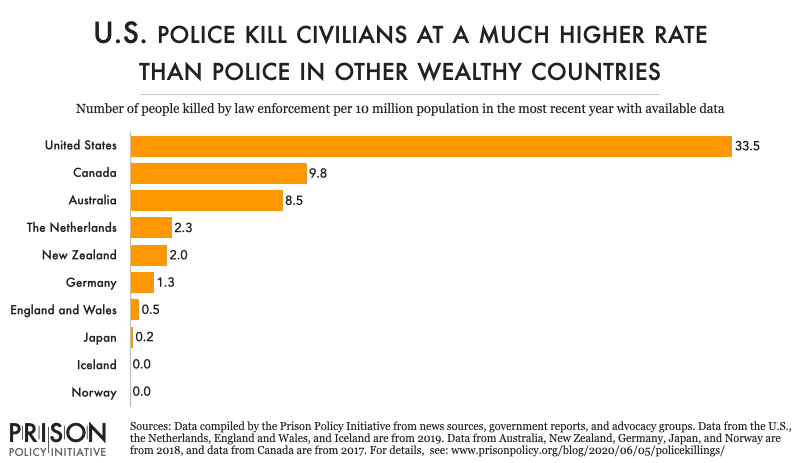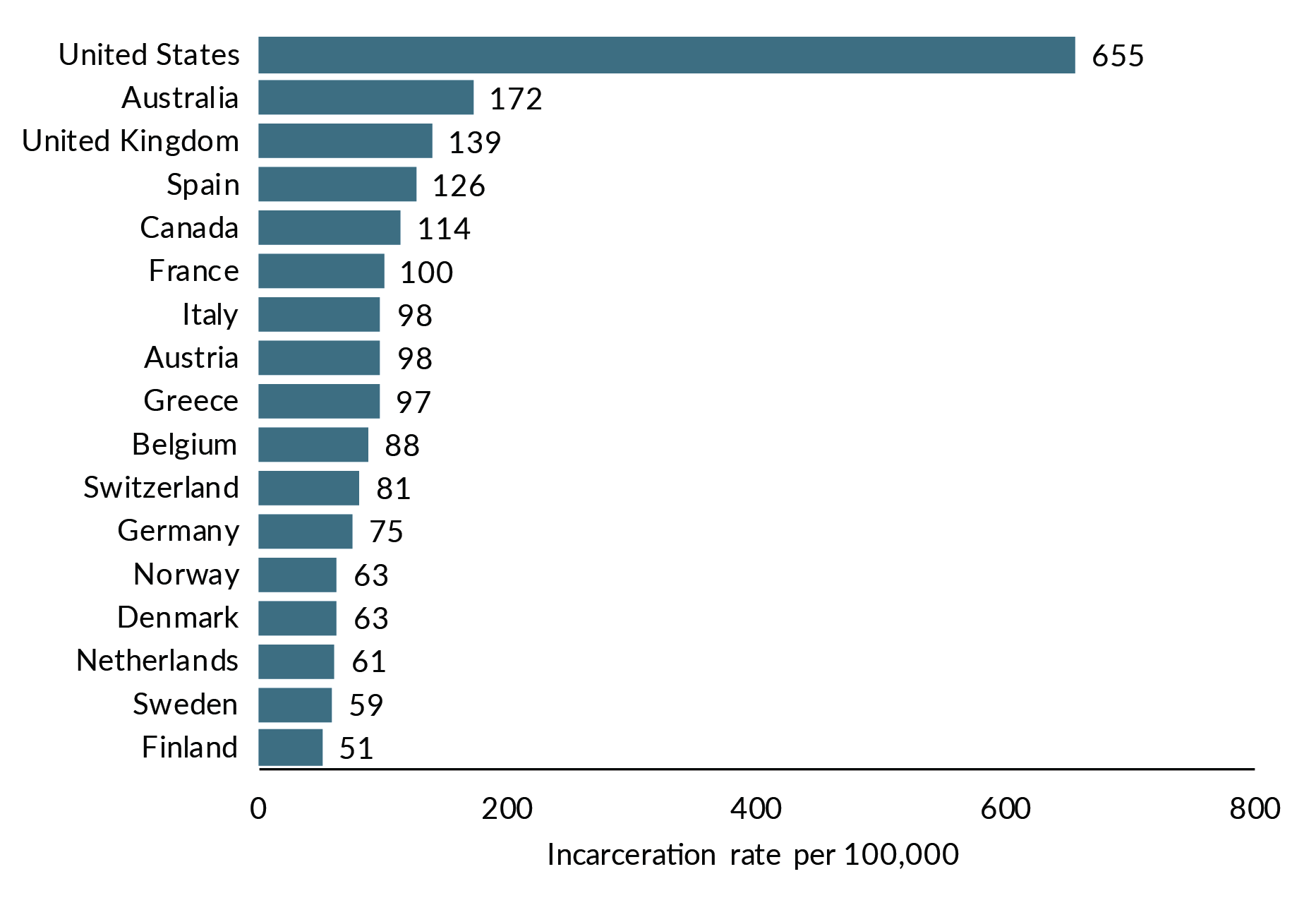Problem
The justice system in America is profoundly unjust. The U.S. is the most unfree country in the world, with a staggering 2 million citizens behind bars. The prison system has become privatized, creating incentives for more and more prisoners. Barbaric practices of torture and the death penalty are carried out by the state at home and abroad, as well as indefinite detention without trial. Mandatory minimum sentences, plea bargaining, debtors prisons, cash bail, and forced confessions plague the lives of millions of people—countless who have committed no crime at all, but simply can’t afford to buy their way out. Participants with the most financial resources have a higher probability of winning cases, which is fundamentally unjust. The criminal/civil law distinction also antagonizes these problems by limiting resources and access to justice and creating disparities.
The U.S. is also notorious for its police violence. Just as the American government funds endless overseas wars, the government funds limitless police violence within its borders, and data suggests that this will only get worse, regardless of what political party is in charge.


Solution
The 36th Amendment defines the goals of the justice system, places maximum sentence limits, prohibits a variety of unjust and notorious practices in the American criminal justice system, establishes new qualifications for all law enforcement officers and federal officers, abolishes majority privately-owned prisons, military tribunals and the criminal/civil law distinction, prohibits the use of private attorneys in court, and limits the use of lethal force.
The Text of the 36th Amendment
Section 1. Principles of Justice
In contrast to retribution, revenge, punishment, or intentional infliction of suffering, the goals of the criminal justice system shall be:
- Reckoning: Acknowledging and confronting wrongdoing to account for harm caused.
- Restitution: Compensating victims for losses or damages incurred due to the offense.
- Repair: Addressing and remedying the harm done to victims and the community.
- Rehabilitation: Providing offenders with opportunities for personal growth and reintegration into society.
- Reconciliation: Facilitating dialogue and mutual understanding between victims and offenders to restore relationships.
- Reconstructive Transformation: Transforming the traumatic experience of both offenders and victims into positive outcomes, fostering growth, healing, and constructive changes within individuals and the community.
In conformity with the above principles and ethical principles, those convicted of crimes or violation of policy are entitled to human rights, to be free from abusive and unethical conditions, the right to legal representation in all periods of their case and sentence, and the right to access adequate healthcare, educational resources, and communication with friends and family.
Section 2. Maximum Sentence
The maximum sentence for any person convicted in court shall be a total combined sentence of (a) eighteen (18) years of just incarceration or twelve (12) years of just incarceration with six (6) years of community service; (b) three (3) years probation; (c) fines six times (6x) the convict’s annual gross income at the time of conviction. Sentences that exceed this maximum are unlawful.
Section 3. Prohibition of Unjust Practices
Due to their injustice, mandatory minimum sentences for crimes, cash bail, plea bargaining, forced confessions, debtors prisons, and forced labor shall be prohibited.
Section 4. Prohibition of Torture and the Death Penalty
Due to their injustice and infringement of sentential rights, all forms of torture or enhanced interrogation techniques, and cruelty on sentience—whether human, animal or cyborg; whether biological, social or psychological in kind; whether for normal or virtual/digital consciousness; whether in civilian or military/government settings—are prohibited. These harmful and unethical activities include, but are not limited to, bodily mutilation or dismemberment, waterboarding, solitary confinement, sleep deprivation, starvation, dehydration, severe bodily restriction, exposure to extreme temperatures, and similar inflictions. Furthermore, all forms of the death penalty are prohibited.
Section 5. Prisons, Incarceration, and Detention
Prisons shall not be majority private-owned and shall not be established in such a way as to incentivize higher rates of incarceration. Prisoners shall participate in the maintenance of, and the democratic decision-making processes governing the operations of, their own resident facility. Prisoners shall have the option, not obligation, of (a) laboring to reduce their sentence by up to one-third by community service, and of (b) laboring for pay during their sentence at a pay rate no less than half the normal hourly or contractual rate. No person shall be subject to indefinite detention without due process of law, and no individual shall be held in custody for more than six (6) hours without a clear and specific charge.
Section 6. Funding and Resources
The government shall allocate resources to community-based programs, mental health services, and initiatives aimed at preventing crime and reducing recidivism. Judicial processes and determinations shall not be determined or influenced by private funding, and all defendants shall have access to adequate legal representation regardless of their financial resources (cf. Section 7).
Section 7. Prohibition of Private Lawyers in Court and Right to Public Attorney
To ensure justice, impartiality, and prevent conflicts of interest in legal proceedings, private lawyers and privately-funded lawyers are prohibited from serving as defense or prosecuting attorneys in court.
Section 8. Law Enforcement, Federal Agent, and Military Officer Qualifications
Law enforcement officers or agents, federal agents, and military officers of any level and jurisdiction are required to have at least (a) one (1) year of full-time study in criminal justice, sociology, social work, and regional or local history and (b) six (6) months of on-the-job training.
Section 9. Limitations and Accountability of Enforcement
All forms of police brutality and excessive force are prohibited. Nonlethal weapons shall be used by law enforcement by default; the use of lethal weapons by police shall only be permitted on a temporary basis and in exceptional circumstances with the verifiable approval of a local or state Executive Board or court. Body-cameras or their equivalent are required for all on-duty law enforcement and may only be temporarily deactivated by verifiable authorization. Furthermore, all levels of law enforcement must incorporate civilian review boards into their organizational structure and provide public access to data on police incidents of force, on complaint statistics, and on disciplinary actions.
Section 10. Abolition of Criminal and Civil Law Categories
All distinctions between criminal and civil law are hereby abolished.
Section 11. Abolition of Military Tribunals
The establishment of separate military tribunals outside of civilian judiciary is hereby abolished.
Section 12. Implementation Schedule
This Amendment is effective immediately upon approval, with the exception of Sections 8, 10, and 11, which shall come into effect two (2) years after approval. All prisoners on death row shall be immediately absolved of the death penalty and, if having served more than six (6) years of incarceration, released within one (1) year of approval. All prisoners who have served more than the maximum sentence in Section 2 shall be absolved and released within three (3) months of approval.